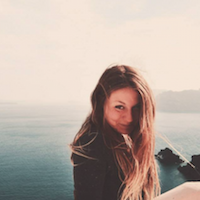I first left the country 10 years ago.
At the time, I was 12 years old and completely unaware of the impact that trip would have on the rest of my life. I visited Guatemala City on a service trip. We stayed in Zone 18, which at the time was ridden with gang and drug violence.
The poverty was unlike anything I had ever seen in my life. The houses were tin shacks stacked on top of each other. It was not uncommon to see policemen walking the streets with bullet proof vests and giant machine guns. I was unprepared for the reality of what I saw. At the time, the most important things in my life were playing soccer and my brand new, pink iPod mini.
As we drove through the slums, I expected to see sad faces and starving children.
Though life in this area was extremely difficult, I have never seen more smiles.
I was included in the soccer games, which were played on a gravel pitch with no shoes and a deflated, torn ball. I came to “help” the community, but I ended up growing much more myself. I realized after returning that material comforts—beyond those necessary for survival—were not essential for happiness, and that the value gained from travel can be just as powerful if you share your experience once you return.
I started traveling on my own once I got to college, and in 2014, I spent the summer in the Republic of Kiribati, a tiny island nation in the Pacific.
I was reporting on the challenges the island nation and its 100,000 inhabitants were facing due to rising sea levels. I landed on the island’s single airstrip after a four-day, 14,000 mile journey across the Pacific, and was greeted with a handmade flower crown and huge hugs from my host family.
Once again, I had expected sad faces, destruction, and poverty, but I was incredibly inspired by the optimism, resourcefulness and cooperation in the communities I visited.
I lived in a thatched, open air hut on stilts—with no walls. I couldn’t find a way to tell my parents I had arrived for over a week and a half. I was living without a phone, reliable internet or clock, and was taking showers with a bucket. I was stripped of all of what I was used to as “comforts” in my former suburban life, yet I had never felt more connected to the people around me or more in tune with nature.
I was completely out of my element, without a working knowledge of the Kiribati language and without any clue how to behave in the village.
I was forced to surrender much more than my material comforts—I surrendered my independence, my personal space and my sense of individuality. I became completely dependent on my host family, who taught me how to survive in the village and welcomed me like their own daughter.
Initially, I was terrified to let go and rely on others, but I gradually saw the value in becoming a part of a community and a family, even if they were complete strangers.
Becoming completely dependent on strangers forced me to trust and be open to others in ways I was formerly afraid of. The benefits of facing this fear and letting it go outweighed any initial discomfort I felt at first as an outsider. Traveling alone forces you to become self-reliant, but in a way this is actually surrendering and putting your life in the hands of the community around you.
Throughout my time in the village, I was often reminded that material comforts—even things like walls or running water—were not essential to find happiness. More importantly, I learned that it is beneficial to let go of part of yourself and completely immerse in the community around you when traveling.
It was only through surrendering my own ideas of how I “should be” living that I was able to fully experience life in the village and connect with the people around me, which is what brought me happiness.
Each time I have traveled alone, I have been embraced with more love than I could have imagined. I have been welcomed like a daughter by those I’d just met and treated like an old friend when I had only expected indifference.
Stepping out of my daily routine and into a new culture always forces me to live in the present moment, because my mind is initially focused on survival, but through this presence I become more aware of the kindness of others—even if it is just a smile.
When I travel today, I always try to remember to ignore what my mind initially registers as “discomfort,” because it is through embracing that discomfort that I have been able to open myself up and connect with those around me, regardless of how differently they live their lives.
~
Relephant Read:
Love, Generosity & Other Lessons I Learned While Traveling Solo.
~
Author: Janice Cantieri
Editor: Toby Israel
Photo: Author’s Own
~











Read 1 comment and reply